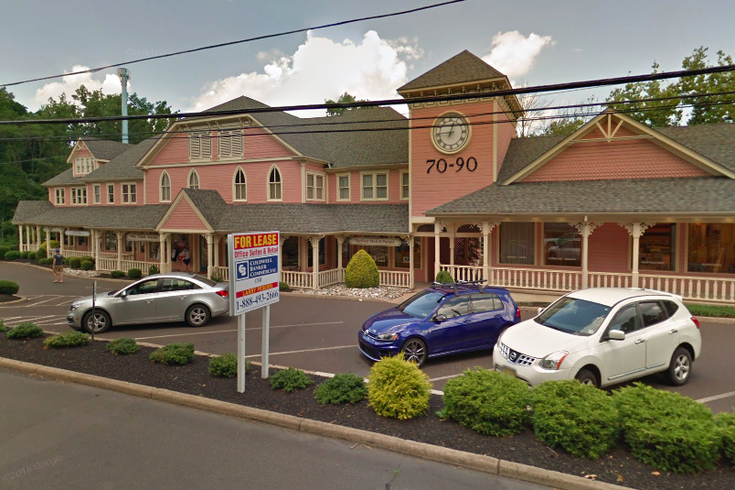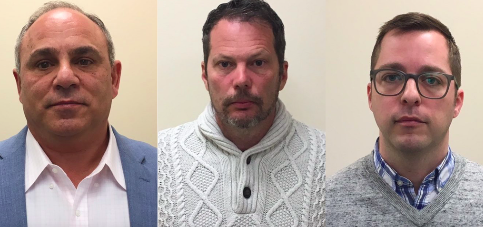
August 28, 2019
 Source/Google Street view
Source/Google Street view
Liberation Way, a former addiction treatment facility, was based at 90 W. Afton Avenue in Yardley, Bucks County. Prosecutors allege the owners, their businesses and several employees were involved in a multimillion-dollar insurance fraud scheme.
Three employees of a shuttered addiction-treatment program in Bucks County have pleaded guilty to charges in an elaborate, multimillion dollar insurance fraud scheme, Pennsylvania Attorney General Josh Shapiro announced Wednesday.
Prosecutors filed charges in March against 11 people and nine businesses associated with Liberation Way, a Yardley-based program that operated multiple treatment centers and unlicensed "sober houses" in Bucks and Montgomery counties.
An 18-month investigation revealed that Liberation Way allegedly exploited vulnerable patients by setting them up with fraudulent high-end insurance policies.
Employees paid premiums on these out-of-network policies without permission, driving up reimbursement rates in a three-year kickback scheme that allegedly netted $44 million in profits.
“These defendants took advantage of the very people they were supposed to help: those suffering from substance use disorder,” Shapiro said. “The opioid, heroin, and fentanyl epidemic is devastating Pennsylvania communities, yet the operators of Liberation Way exploited this crisis for their own benefit."
Liberation Way co-founder and CEO Jason Gerner, 46, entered a guilty plea Wednesday on charges including corrupt organizations, dealing in proceeds of unlawful activities, criminal conspiracy, insurance fraud and identity theft.
Dana Fetterman, the brother of deceased co-founder Dallas Fetterman, also pleaded guilty along with employee Michael Sarubbi II, who helped disguise the source of funds used to pay for patient premiums.
Employees of Liberation Way, a former addiction treatment program in Bucks County, Pennsylvania, overbilled insurance companies to collect $44 million in profits from reimbursements. Three employees pictured above pleaded guilty to state and federal charges. From left: Michael Sarubbi II, 53, of Cherry Hill, New Jersey; Jason Gerner, 46, of Shamong, New Jersey; and Dana Fetterman, 35, of Haddon Township, New Jersey.
About $17 million of that total came from overbilling, mostly for treatment that was substandard, medically unnecessary or almost non-existent.
One alleged kickback scheme involved thousands of urine tests that investigators said had been sent to a Florida lab for analysis.
Patients were allegedly goaded by employees to provide as many as four urine samples daily. The employees would receive cash payments and the lab results often were not even entered into patients' medical files, according to the grand jury presentment.
When the Florida labs billed insurance companies, a portion of each fee was sent back to Gerner and Fetterman, prosecutors alleged. If the fees were not paid in full by insurance companies, Liberation Way allegedly threatened lab representatives, patients and patients' families, demanding that they pay outstanding balances.
Investigators also found troubling evidence surrounding Liberation Way's treatment facilities.
Patients were often directed to live at company-owned, unlicensed "sober homes" that operated outside the industry's norms for outpatient treatment, according to the grand jury presentment.
Patients at these "sober homes" were not permitted to come and go freely, effectively making the properties unlicensed inpatient facilities, prosecutors said. One location in Montgomery County, known as a "party house," purportedly left patients susceptible to relapse in unsafe conditions.
Some of the homes were co-ed, which is not common in addiction treatment facilities, and investigators found that Liberation Way employees allegedly were involved in sexual relationships with patients actively receiving treatment.
In December 2017, after three years of operation, Liberation Way was sold to a private equity firm for $41.6 million. The proceeds of the sale were divided among its owners and investors, including Gerner and Dallas Fetterman's estate, prosecutors said.
“These defendants held various positions within the Liberation Way organization, but they all had one thing in common – all had a responsibility to the people they were serving, the people who needed help," said First Assistant U.S. Attorney Jennifer Williams. "They failed in this important responsibility and are now paying the price."
 Source/Pennsylvania Attorney General's Office
Source/Pennsylvania Attorney General's Office